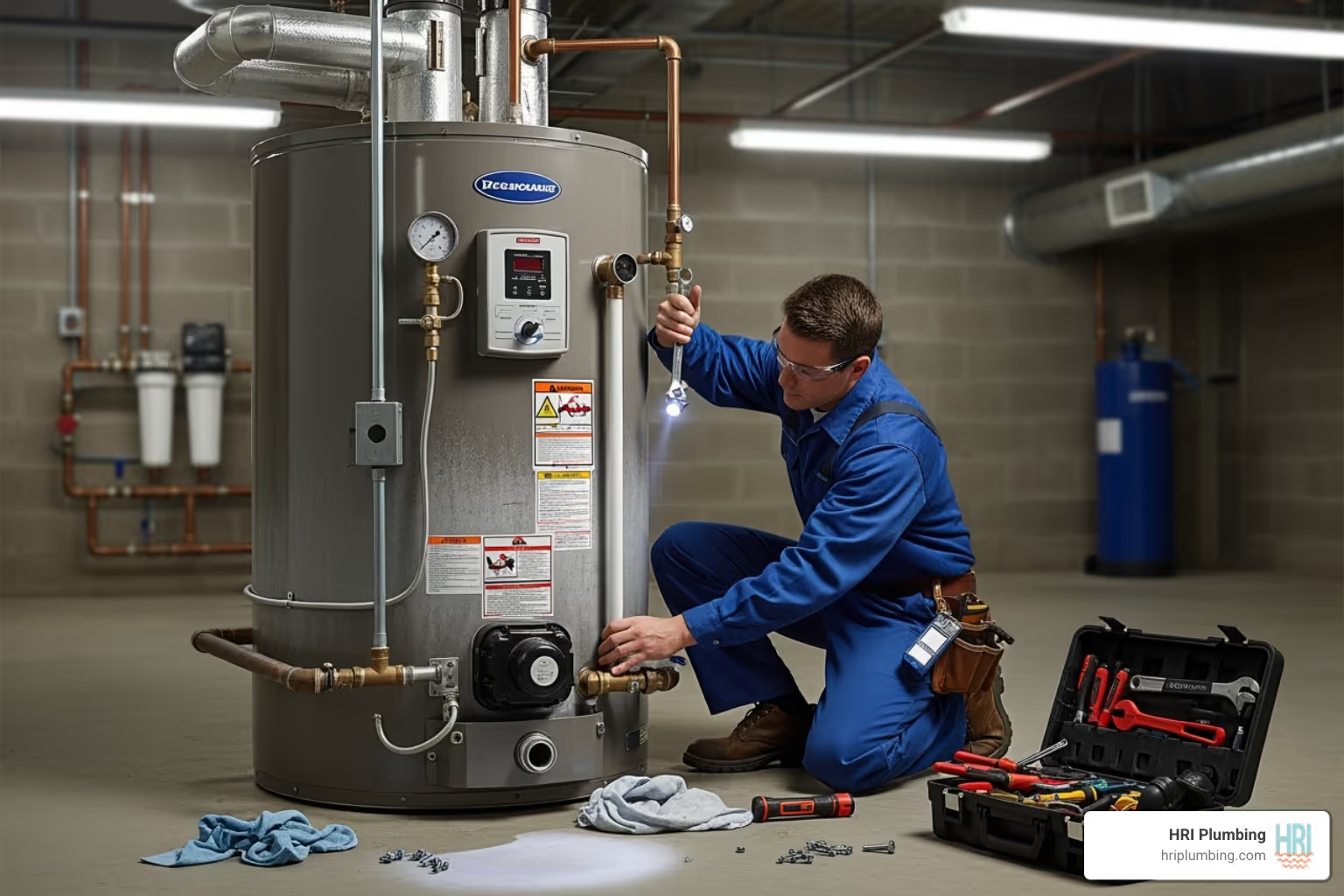The Unseen Engine of Your Business
Commercial water heater repair is critical for your business. When hot water fails, operations can grind to a halt, affecting customer satisfaction and leading to lost revenue.
Quick Commercial Water Heater Repair Guide:
- Emergency Signs - Major leaks, gas smells, no hot water during peak hours
- Common Issues - Rust-colored water, unusual noises, inconsistent temperatures
- Professional Help - Licensed technicians required for high-voltage electricity and gas lines
- Repair vs Replace - Units over 10 years old may be better candidates for replacement
- Minimize Downtime - Choose 24/7 service providers and schedule during off-peak hours
Your commercial water heater quietly powers essential functions, from restaurant kitchens to healthcare sanitation. But when problems strike, the impact is immediate. Water leaks can cause property damage. Temperature fluctuations disrupt service. Complete failures shut down operations entirely.
Most commercial water heater problems show warning signs before they become emergencies. Recognizing these signals early and knowing when to call a professional can save your business thousands in emergency repairs and lost revenue.
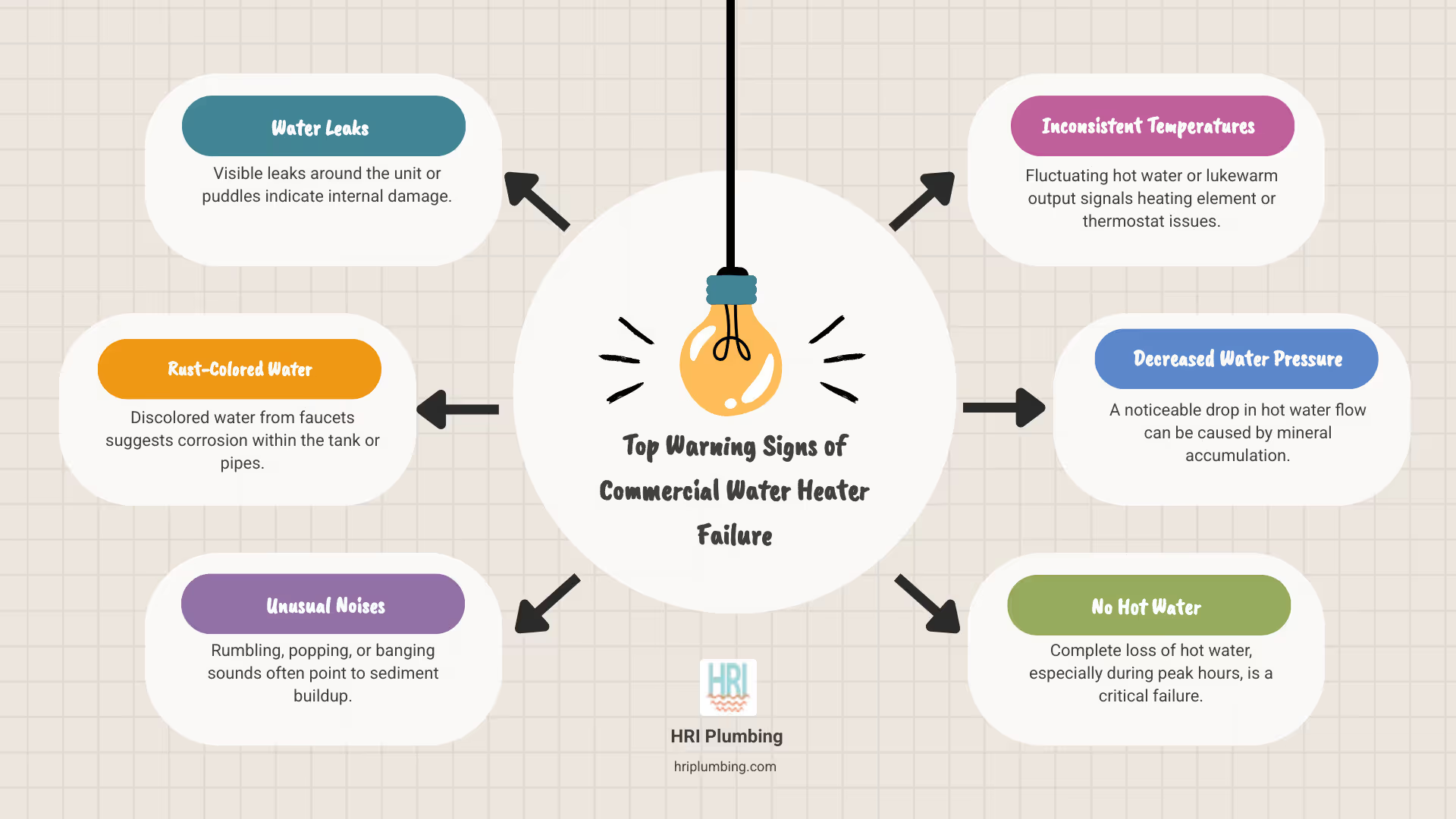
Is Your Water Heater Sending Distress Signals?
Your commercial water heater provides warning signs before a major failure. Learning to spot them is your chance to catch problems before they turn into business-stopping emergencies.
Water leaks are a common red flag. Even small puddles need immediate attention, as a tiny drip can escalate into a flood. Leaks can stem from loose connections, a failing pressure relief valve, or cracks in the tank. If you spot a leak, you can minimize damage by shutting off the water and gas supplies. This video shows you how to turn off water and gas supplies safely.
Rust-colored water indicates internal corrosion, likely from a depleted anode rod or the tank itself. It's unsightly and can affect product quality.
Unusual noises like rumbling, banging, or popping usually indicate sediment buildup. This forces the heating element to work harder, causing the noise and wasting energy.
Inconsistent temperatures often point to a faulty thermostat, a broken heating element, or an undersized system. This can disrupt service and create safety issues.
No hot water is the ultimate wake-up call, bringing many commercial operations to a grinding halt. The cause could be a tripped breaker, a failed pilot light, or a burned-out heating element.
Low water pressure affecting only your hot water supply often signals sediment buildup or issues with the heater's connected lines.
For more details, check our guide on common water heater issues that require repair.
When to Call for Emergency Service
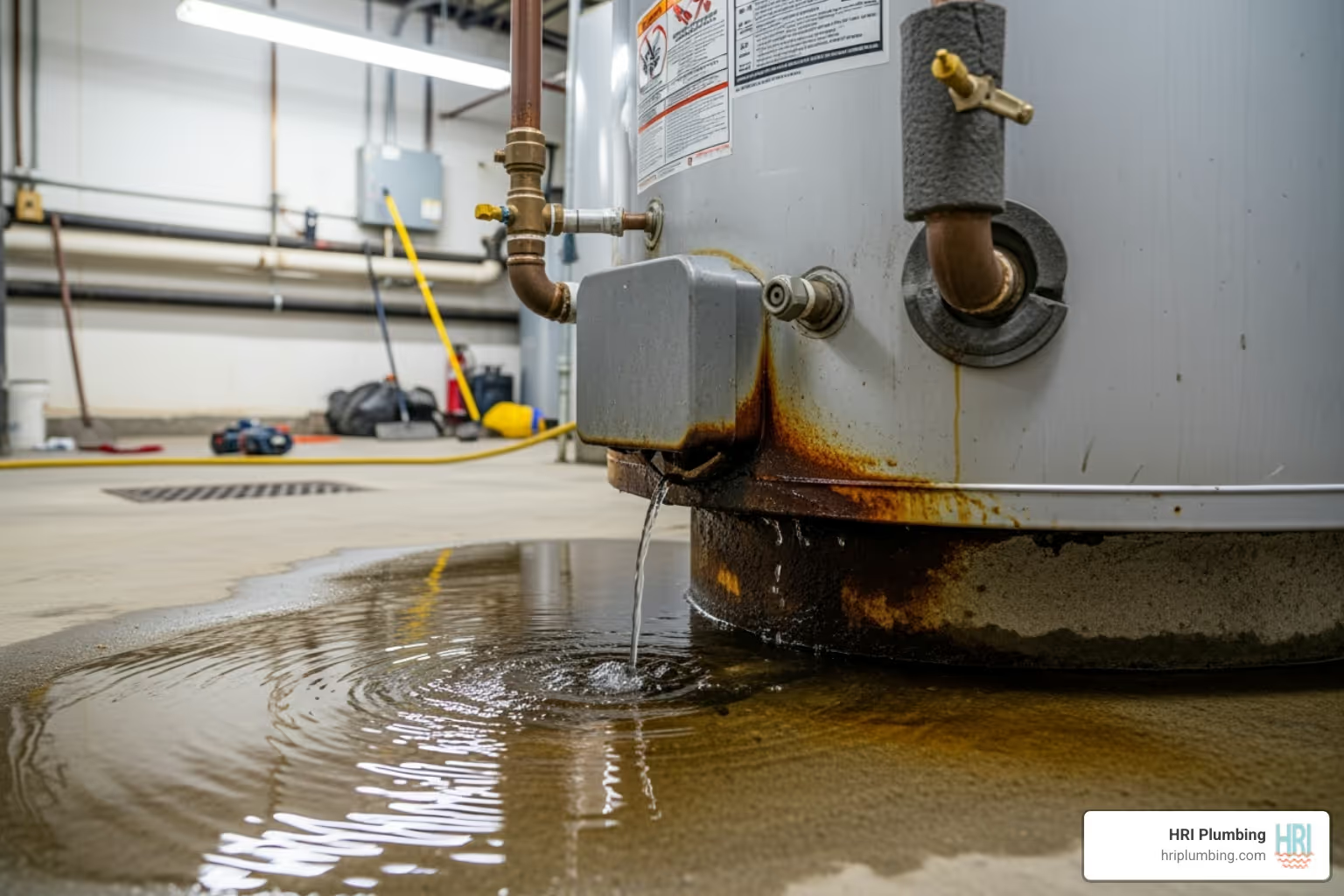
Some problems are emergencies that need immediate attention.
Major leaks demand immediate action to prevent extensive water damage. Shut off the water supply and call for emergency help to avoid thousands in damages. For local guidance, see our post on water heater leaking in Springfield, IL.
A gas smell (like rotten eggs) indicates a potentially deadly gas leak. Evacuate immediately, shut off the gas supply only if it's safe to do so, and call your gas company and our emergency line from a safe distance.
No hot water during peak hours is a business emergency. It's revenue-threatening, which is why we prioritize these urgent calls for commercial water heater repair.
Electrical issues like flickering lights, burning smells, or buzzing require immediate professional help. Do not attempt DIY repairs on high-voltage systems.
At HRI Plumbing, we know emergencies don't wait. Our 24/7 support covers Springfield, Jacksonville, Sherman, Rochester, Chatham, and Rushville, because your business can't afford to wait.
Your Guide to Professional Commercial Water Heater Repair
While it may be tempting, DIY commercial water heater repair is dangerous. These systems involve high voltage electricity, gas lines, and complex plumbing that require specialized knowledge to handle safely. Attempting a repair yourself can turn a manageable issue into a disaster and may even void your manufacturer's warranty.
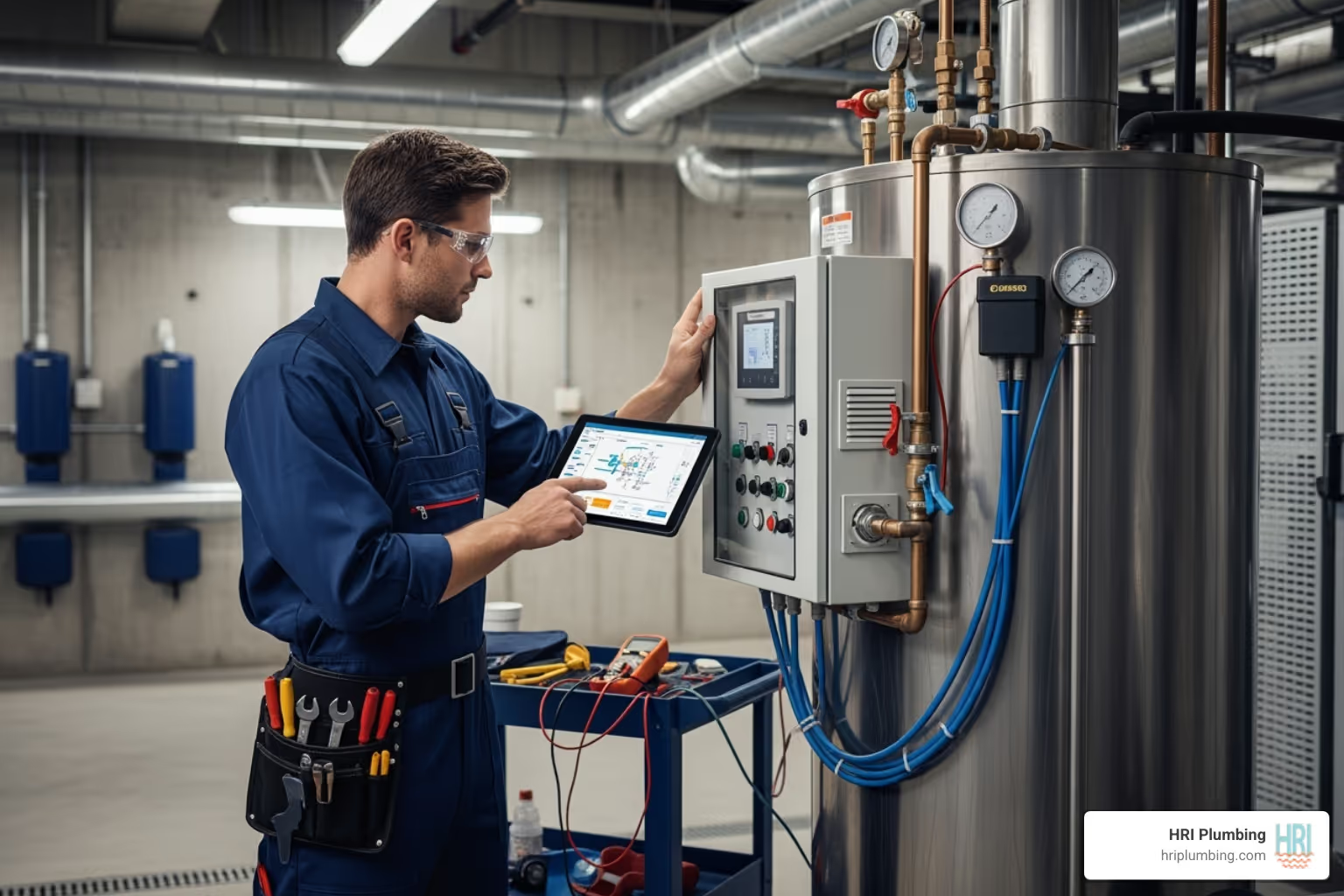
Licensed professionals bring safety expertise, the right tools, and ensure everything meets code compliance. Proper diagnostics requires training to identify the root cause, which could be anything from electrical issues to sediment buildup. Our team has the tools and training to fix problems correctly the first time.
For comprehensive services, see our Commercial Plumber in Springfield, IL page.
Finding the Right Service Provider
Choosing the right plumber is crucial, as downtime directly impacts your business. Look for a partner with these qualities:
- 24/7 availability: Emergencies happen outside business hours. We offer round-the-clock service to prevent lost revenue.
- Licensed and insured: This protects your business from liability during the repair.
- Experience with commercial systems: These units are more complex than residential models, and our technicians have the necessary expertise.
- Upfront pricing: We provide transparent pricing so you can make informed decisions without hidden fees.
- Local reputation: We've built our reputation in Springfield, Jacksonville, and surrounding areas by providing honest, high-quality service.
- Minimizing downtime: We stock common parts and respond quickly to restore your hot water as fast as possible.
The True Cost of Commercial Water Heater Repair vs. Replacement
Deciding whether to repair or replace your water heater involves considering long-term efficiency and reliability, not just the immediate cost.
Unit age is a key factor. Repair is usually best for units under 8 years old. For units over 8-10 years, replacement is often the smarter long-term investment.
FactorRepairReplacementAge of UnitBest for units under 8 years oldConsider for units 8+ years old (typical lifespan: 10-20 years)Cost of RepairLower upfront cost for minor issuesHigher initial investment, but long-term savingsFrequency of IssuesGood if problems are rareBetter if repairs are becoming frequentEnergy EfficiencyOlder units remain less efficientOpportunity to upgrade and reduce utility bills
If repair costs approach 50% of the replacement cost, investing in a new unit is often a better use of funds. Frequent repairs are another clear sign that replacement may be necessary to avoid constant downtime.
Newer models offer significant energy efficiency gains, and upgrading can lead to substantial utility savings. While replacement costs are higher upfront, the long-term benefits of energy savings, reliability, and a new warranty often make it a cost-effective choice. Our team can help you decide, but you can also read our article on Signs you need to replace your water heater.
Know Your System: Types of Commercial Water Heaters
Understanding your system is the first step in commercial water heater repair, as different types have unique service needs.
Conventional tank heaters are the workhorses of the commercial world. These reliable units store large volumes of hot water in an insulated tank, ready for use. They are available in both gas and electric models. The main downsides are standby heat loss, which leads to higher energy bills, and their large size.
Tankless (on-demand) heaters heat water as it flows through a heat exchanger, eliminating standby heat loss. They provide a continuous supply of hot water, making them ideal for businesses with high demand, like restaurants and hotels.
Hybrid models combine a heat pump with a storage tank, extracting heat from the surrounding air to warm the water. This technology can dramatically reduce energy costs.
When choosing between gas versus electric systems, consider local utility costs. Gas heaters often have lower operating costs and faster heating, while electric units are simpler to install and ideal where gas isn't available. Some businesses still prefer the reliability of traditional water heaters.
Key Differences in Servicing: Tank vs. Tankless Commercial Water Heater Repair
Servicing tank and tankless heaters requires different expertise, as their internal components are vastly different.
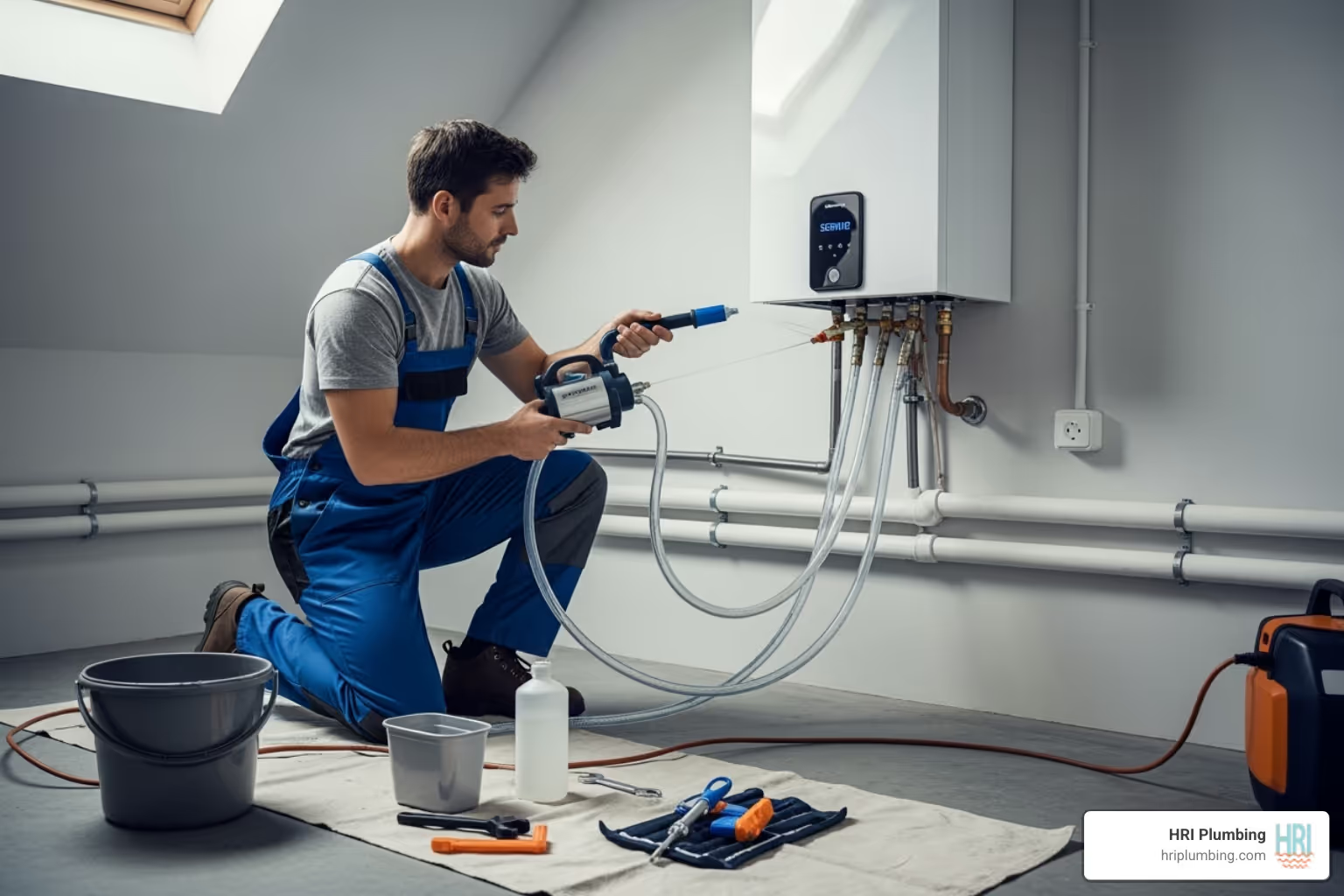
For traditional tank systems, the main issues are:
- Sediment buildup: This is the primary problem, causing noise and forcing the system to work harder.
- Anode rod failure: This rod prevents corrosion and must be checked regularly, as a depleted rod leaves the tank vulnerable to rust.
- Component failure: Common repairs include replacing burned-out heating elements in electric models or fixing pilot light and thermocouple issues in gas units.
Tankless systems have different challenges:
- Descaling: This is the main maintenance task, as mineral buildup on the heat exchanger reduces efficiency and can cause damage, especially in areas with hard water.
- Electronic failures: Repairs often involve complex components like flow sensors, igniters, and electronic control boards.
This complexity means tankless repairs require specialized diagnostic tools and electronic troubleshooting skills. For more on tankless systems, explore the benefits and limitations of tankless water heaters.
Prevention is Better Than Cure: Extending Your Water Heater's Lifespan
Regular maintenance for your commercial water heater is like a tune-up for your car—it prevents unexpected breakdowns when you need it most. Preventative maintenance is essential for avoiding costly emergency repairs during peak business hours.
Key benefits include:
- Improved efficiency: A well-maintained heater uses less energy, leading to lower monthly utility bills.
- Longer lifespan: Consistent care can help your unit reach the 20-year mark, delaying expensive replacement costs.
- Fewer breakdowns: Catching issues early prevents emergencies, keeps operations smooth, and ensures customer satisfaction.
For tankless systems specifically, learn more about Maintaining a tankless water heater.
Essential Maintenance Checklist
This checklist includes tasks for both you and a professional. Knowing the difference saves time and money.
- Annual flushing (Professional): This is critical for tank heaters to remove sediment buildup, which causes inefficiency and noise.
- Anode rod check (Professional): A professional check every 2-3 years is a small investment that prevents rust and can add years to your tank's life.
- Pressure relief valve test (DIY): Perform this safety test annually. Lift the lever to ensure water flows out and stops upon release. If it fails or drips, call a professional.
- Thermostat checks (Professional): If you notice temperature inconsistencies, the thermostat may need professional calibration or replacement.
- Visual inspections for leaks (DIY): Regularly check for leaks around the unit and its connections. Catching a small drip early can prevent a flood.
- Descaling (Professional): For tankless systems, professional descaling is crucial for removing mineral buildup from the heat exchanger, especially in areas with hard water.
At HRI Plumbing, our certified technicians handle all these maintenance tasks and more. For comprehensive service options, visit our Water Heater Repair & Replacement page.
Frequently Asked Questions about Commercial Water Heater Service
Here are answers to common questions business owners have about commercial water heater service.
How long do commercial water heaters typically last?
Most units last between 10-20 years. The actual lifespan depends on several factors:
- Regular maintenance: This is key. Well-maintained units can reach the 20-year mark, while neglected ones may fail after only 8 years.
- Usage patterns: Higher usage, like in a busy restaurant, will lead to more wear and a shorter lifespan.
- Water quality: Poor water quality, especially hard water, accelerates corrosion and sediment buildup. A water softener can extend your heater's life.
How can my business minimize downtime during a repair or replacement?
Minimizing downtime is critical to avoid lost revenue. Here’s how we help:
- Scheduling during off-peak hours: We minimize disruption by scheduling service during your off-peak hours, including evenings and weekends.
- 24/7 availability: Our 24/7 availability for commercial water heater repair ensures we can respond to emergencies immediately.
- Temporary solutions: When possible, we can provide temporary solutions to keep your business running during a major repair or replacement.
- Proactive replacement planning: For units over 10 years old, planning a replacement in advance avoids an emergency shutdown.
Is a tankless water heater better for my business?
Whether a tankless heater is better for your business depends on your specific needs. The main advantages are:
- Energy efficiency: Tankless units heat water only on demand, which can reduce energy costs by up to 30%. Learn more about the Energy-saving benefits of tankless water heaters.
- Endless hot water: They provide a continuous supply of hot water, a major benefit for high-demand businesses like restaurants and hotels.
- Space savings: Their compact, wall-mounted design saves significant space compared to bulky tank heaters.
The upfront cost is higher, but long-term energy savings and a 15-20 year lifespan often make it a cost-effective choice. We can assess your specific needs to help you determine the best solution.
Keep Your Business Running Hot with Expert Support
Your commercial water heater is a vital,, part of your business. When it fails, it can bring operations to a halt at the worst possible time. Proactive maintenance is essential for preventing costly emergency repairs and ensuring you can keep your doors open and customers happy.
Most emergencies are preventable. Regular professional repair and maintenance protect your business continuity and can extend your heater's lifespan from 8-10 years to 15-20 years.
HRI Plumbing understands that your hot water needs don't follow a 9-to-5 schedule. Whether you're running a 24-hour diner in Jacksonville, managing a busy hotel in Springfield, or operating a manufacturing facility in Rushville, we know that when your water heater goes down, every minute counts. That's why we offer 24/7 support – because plumbing emergencies don't wait for convenient business hours.
Our experienced team handles everything from minor adjustments to complete overhauls with honesty and integrity. We provide straightforward advice on whether to repair or replace your unit. We serve Springfield, IL and the surrounding communities of Jacksonville, Sherman, Rochester, Chatham, and Rushville with the same dedication – treating your business like our own.
Don't wait for a breakdown to find how much your hot water system means to your operations. For expert water heater repair in Springfield, IL, contact us today! Let's work together to keep your business running hot.


